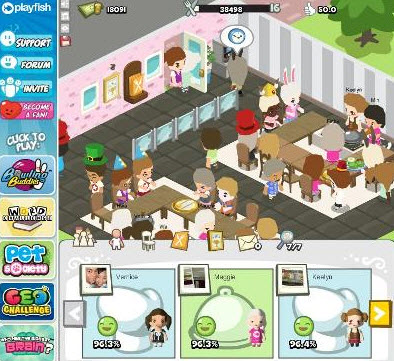 Electronic Arts confirmed rumors this morning as it acquired Playfish for $300 million in cash and stock. The move gets EA into the social gaming market on Facebook in a big way.
Electronic Arts confirmed rumors this morning as it acquired Playfish for $300 million in cash and stock. The move gets EA into the social gaming market on Facebook in a big way.
The value of the deal — $275 million in cash, $25 million in stock, and up to $100 million in bonus cash if certain milestones are hit by 2012 — reflects the rapid growth of Playfish over the last couple of years. Playfish is the second-largest developer on Facebook, behind only Zynga. It has more than 60 million monthly active users, according to AppData.
With the deal, EA will become a major player in social games, the hottest part of the game industry and a field dominated by three companies: Zynga (see our profile), Playdom (see profile) and Playfish (see profile). Playfish will operate within EA Interactive, a division focused on the web and wireless games.
The deal is a big win for Accel Partners and Index Ventures, which together invested only $21 million into the Playfish.
 In acquiring Playfish, EA is putting pressure on the social game market leader Zynga — an upstart which is now reportedly making well over $100 million in revenue a year. But in many ways, Playfish may be a better deal for EA. Had EA tried to buy Zynga, it probably would have had to pay a much higher price. And Zynga is considered by some to be more risky, because has been more aggressive with controversial in-game offers.
In acquiring Playfish, EA is putting pressure on the social game market leader Zynga — an upstart which is now reportedly making well over $100 million in revenue a year. But in many ways, Playfish may be a better deal for EA. Had EA tried to buy Zynga, it probably would have had to pay a much higher price. And Zynga is considered by some to be more risky, because has been more aggressive with controversial in-game offers.
Playfish created original titles such as “Who has the biggest brain?” and “Restaurant City.” While these titles resemble older video games, they were new to Facebook and consistently performed well.
Zynga, by contrast, has been known for a few hits such as its poker and mob games, which made Zynga a cash cow — and allowed it to create knock-offs of other hit titles. Zynga’s Cafe World, which many deride as a clone of Playfish’s Restaurant City, launched many months after the Playfish title and shot ahead of it to 28 million monthly active users, compared to Restaurant City’s 18 million users.
EA itself has tried to come up with hit Facebook games, but it hasn’t been easy. While console games take a team of 100 people and sometimes two years to three years to develop, Facebook games are created within a matter of weeks. And the games are constantly revised in response to user feedback. They are also launched as free games to attract lots of users. They make money with ads and because a small number of the users will pay for virtual goods, such as better weapons or clothing.
The emphasis on doing original and high quality games set Playfish apart and made it more attractive to EA. As mentioned, Playfish avoided heavy advertising of its games and relied more on word-of-mouth than controversial promotional techniques to spread its games. Even with that conservative strategy, Playfish grew to more than 150 million registered users. Playfish chief executive Kristian Segerstrale noted in a statement that EA Interactive’s entrepreneurial culture is a match for Playfish’s.
“Social gaming, with its emphasis on friends and community, is seeing tremendous growth and this is the right time to invest to strengthen our participation in this space,” said Barry Cottle, senior vice president and general manager of EA Interactive in a statement. “…with the addition of proven expertise from Playfish, their broad consumer base and strong game brands, we’re moving ahead aggressively in our plans to lead in the category of cross-platform social entertainment.”
The word about the acquisition had been spreading for weeks, but both EA and Playfish executives dismissed them as rumors. Jeremy Liew, managing director at venture firm Lightspeed Venture Partners, said it will be interesting to see what happens next. Zynga seems determined to do an IPO, and Playdom would likely command a high price. But there is a tier of smaller social game companies that will likely be acquired by other big game companies and brands who want to get a piece of the social gaming action. Liew said the price that EA paid validates those who believe that social games is a disruptive force in games.
“It’s a reflection of the opportunity in this space,” Liew said.
 [The excitement in this industry is one of the reasons why we’re holding an executive event called DiscoveryBeat on Dec. 8 in San Francisco. The event will explore the secret recipe for getting your social game or mobile phone application “discovered” in an age of increasing noise. We’ll have Playfish Co-founder and President Sebastien de Halleux speaking, among others. Get your early bird ticket by Nov. 20.]
[The excitement in this industry is one of the reasons why we’re holding an executive event called DiscoveryBeat on Dec. 8 in San Francisco. The event will explore the secret recipe for getting your social game or mobile phone application “discovered” in an age of increasing noise. We’ll have Playfish Co-founder and President Sebastien de Halleux speaking, among others. Get your early bird ticket by Nov. 20.]
VentureBeat's mission is to be a digital town square for technical decision-makers to gain knowledge about transformative enterprise technology and transact. Learn More
